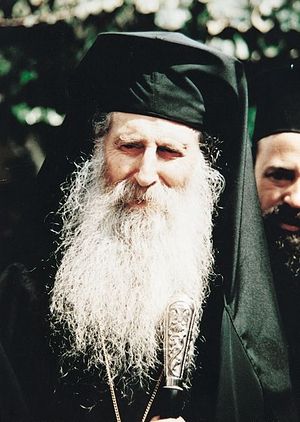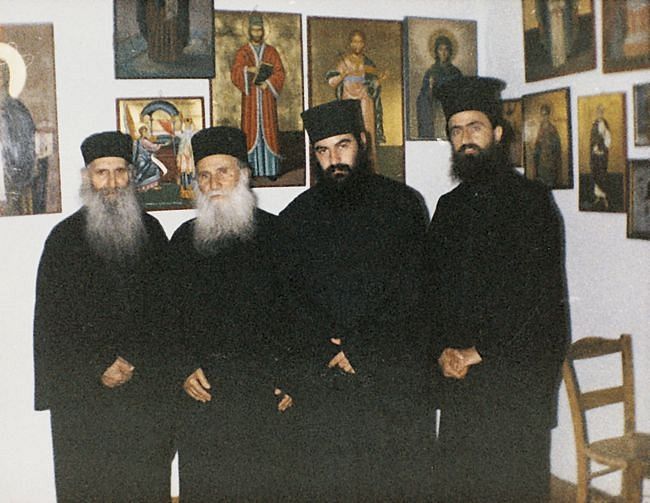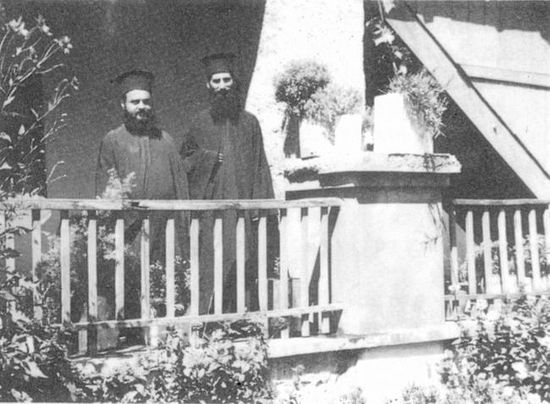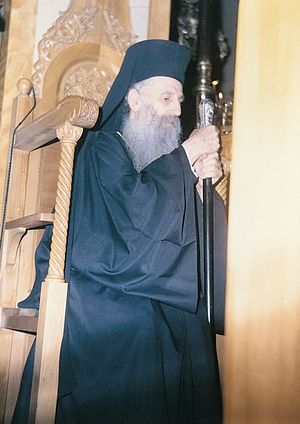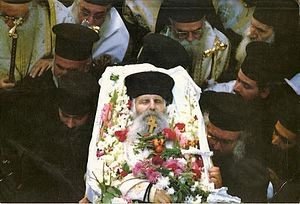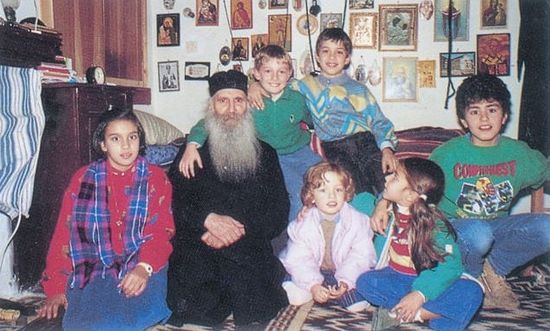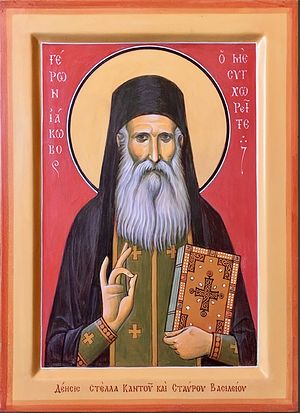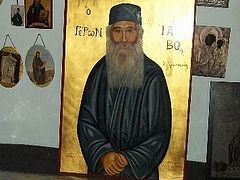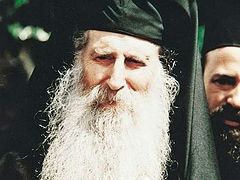On November 27, 2017, the Holy Synod of the Patriarchate of Constantinople glorified Elder Iakovos (Tsalikis) as a saint. Fr. Iakovos, laboring in the Monastery of St. David of Evia, was widely known already during his lifetime among the Orthodox as a man of prayer, a clairvoyant, and a healer of spiritual and bodily ailments, and not just in Greece. With the elder’s death, the miracles by his prayers only increased, and the people revered him as a saint. And now it is certified and formal.
The memory of St. Iakovos is celebrated on November 22.
Elder Iakovos was born on November 5, 1920 into the pious family of Theodora from the village of Livisi in Asia Minor and Stavros from the island of Rhodes. His mother’s family carefully preserved Church traditions and were known in the patriarchate as benefactors of the schools of the Fethiye Region.
A tragedy occurred at the beginning of 1922: Turks seized the boy’s father and took him to Asia Minor, after which his family was forced to travel the heavy path of emigration: They headed for Itea by boat, and from there to Amfissa, where by good fortune they met young Iakovos’ father. Then the entire family relocated to the village of Farakla, on the island of Evia.
Little Iakovos was seven when he learned the Divine Liturgy by heart, before he even knew the alphabet. In 1927, he started school, where he was distinguished by particular progress, and his love for the Church was obvious to everyone.
At that time, St. Paraskeva, who often healed his fellow villagers, appeared to him and revealed to the boy his bright future in the Church.
In 1933, Iakovos finished elementary school, but money problems in his family did not allow him to continue his studies. He began to help his father at work.
The metropolitan of Chalkida, impressed by Iakovos’ chanting, made him a reader. Beginning in 1938, the youth’s life continued in asceticism: He ate little, almost didn’t sleep, was constantly in prayer, and worked hard.
During the Second World War, the suffering and sorrow of occupation exhausted the unfortunate refugees. In 1942, Iakovos’ mother reposed, predicting to her son that he would become a priest.
Iakovos was called into the army in 1947. His fellow soldiers, teasing him, gave him the nickname “Fr. Iakovos,” although such ridicule did not bother the future elder.
His commander especially respected him and was one of those who understood that a remarkable future awaited Iakovos, this young son of a refugee.
After demobilization in 1949, Iakovos (twenty-nine at the time), lost his father. He took upon himself care for his sister and her arrangements. But working much, Iakovos did not forget about what he had striven for in the preceding years—monasticism.
In November 1952, fulfilling his mother’s desire to give his sister in marriage, Iakovos went to the Monastery of St. David of Evia in the village of Rovies to fulfill his dream. Nearly thirty-two years old, Iakovos became a novice, and on December 19, 1952, Metropolitan Gregory ordained him to the priesthood in Chalkida.
Thus began the monastic life of Iakovos: work in the monastery, prayer in the cave of St. David, and miracles, which have only multiplied with time.
His extreme level of asceticism led Fr. Iakovos to a high spiritual level. Demons severely tormented him, repeatedly. St. David and St. John the Russian often appeared to Fr. Iakovos, honoring him with their conversation; he also had an extraordinary prophetic gift.
And in August 1963, he miraculously fed with generous portions, having only two-and-a-half okas1 of manestra,2 seventy-five workers, after which he still had half a pot remaining.
On June 25, 1975, Elder Iakovos rose to the helm of the management of the monastery.
His strict abstinence and ascetic life eroded the elder’s health: The veins on his feet were swollen; he underwent surgery for the removal of his inguinal hernia and appendicitis, and then another surgery on his prostrate and heart. According to Professor Dimitris Kremastinos, who put in Fr. Iakovos’ pacemaker, “Batushka was supported only by Divine power.”
Elder Iakovos left the administration of the monastery in 1990 due to poor health. He was more and more beset by sickness, and in September 1991, after a minor heart attack, the elder was hospitalized. Having been treated, Fr. Iakovos returned to the monastery, but an inflammation began which developed into pneumonia. The elder had a premonition of his impending repose.
On the morning of November 21, 1991, he went to the service, sang on the kliros, and partook of the Holy Mysteries of Christ. Then the elder confessed several faithful and walked around the monastery inside and out. At noon, Fr. Iakovos heard the confession of his spiritual daughter and of a monk who was in obedience to Fr. Hilarion; this monk was to be ordained as a hierodeacon that day by the metropolitan of Chalkida.
When the brethren entered, Fr. Iakovos tried to get up, but he felt dizzy. His breathing became labored, his pulse weakened, and from his mouth came forth only a weak exhalation. The elder was already on the path to eternity.
Little was said about the elder’s death, but the phones were working full blast, spreading the news of this sad event. The following day, thousands of people came—clergy of all degrees and spiritual children of the elder from throughout all of Greece—to give him their last kiss: The monastery courtyard was overflowing with people.
His funeral was held under the open sky, and after the homily, Metropolitan Prokopios of Cephalonia asked to raise his body higher, that all the faithful could see the elder. As soon as they showed his relics, the thousands of faithful called out as with one voice, “A saint, a saint.”
A promise
While still living in the world, Iakovos burned with the desire to go to the Holy Land and lead his life in seclusion there, dedicated to asceticism; but before that he considered it necessary to visit St. David of Evia’s Monastery, to ask him for help and intercession.
St. David appeared to him at that time. He showed him that the monastery, that Heavenly republic of ascetics, was now nearly ruined, and Fr. Iakovos promised St. David that he would remain in his monastery. And so he did.
At that time, the monastery, with its peculiar internal structure, was inhabited by three elders. The abbot was the blessed Archimandrite Nikodemos (Fomas), a virtuous, genteel, and endlessly merciful man, laboring with great zeal over the restoration of the monastery.
A monk
Fr. Iakovos took an oath of complete obedience at the beginning of his monastic life, and never did anything without the blessing of the abbot. But to receive a blessing, he had to traverse a tedious path for three or four hours: His spiritual father, fulfilling his pastoral duties, was often in the village of Limni.
This irreproachable obedience of Fr. Iakovos and fiery zeal, with which he performed corporal and spiritual labors in the monastery, aroused the envy of the devil, the hater of every good, who from the very beginning set the older inhabitants of the monastery against the young monk. A multitude of afflictions, sorrows, and trials, which manifested in the brethren’s treatment of him, were sent to him by the Lord, but Fr. Iakovos did not give up and continued to fight.
Fr. Iakovos was faced with difficulties quite characteristic of that time—the unimaginable poverty of the monastery; the dilapidated, freezing cell with broken shutters, into which the inclement winter snow flew in through the cracks; the holes in the floor, where the monastery goats huddled… They lacked basic necessities, including winter clothing and shoes, and with the beginning of rain, snow, and cold, Fr. Iakovos literally froze and often got sick.
All of these torments inflicted his body with serious wounds, but not one of them touched his soul, and nothing could shake his spirit. However, the enemy of mankind could not accept this, continuing to use all kinds of tricks, using all of his arts. He did not limit himself to invisible attacks, which came to naught against the elder’s goodness, prayer, meekness, and humility, but he also visibly attacked him.
Once, when the elder was working, demons attacked the ascetic: In the guise of a man, of monkeys, of other creatures they approached him eighteen times, beat him half to death, and then simply disappeared when Fr. Iakovos managed, with difficulty, to raise his hand to protect himself with the Sign of the Cross.
Another time, the demons again attacked him, but not so vehemently. To frighten the elder, they took on the form of innumerable legion of thousands of scorpions. It was in a cave near the Monastery of St. David, where Fr. Iakovos often went to spend the night in prayer. The bright star, illuminating the path and helping him reach the cave was nothing other than an angel of God—thus the Lord fulfilled the saint’s prayerful request.
Fr. Iakovos was not afraid during the attacks of the demon scorpions. Sensing the presence of the impure ones near him, he drew an outline around himself, which the scorpions could not cross, bound by the elder’s command—the Lord gave His faithful servant this sign as a symbol of authority to use His Divine power.
Fr. Iakovos withstood these and other temptations and trials by his unshakable faith in the Lord and his deep love for St. David, his truly iron patience, his exceeding stability and meekness, his unceasing prayer, and his endless love for all people. The words, the Kingdom of Heaven suffereth violence, and the violent take it by force (Mt. 11:12) were fully mastered by the elder.
The desire to achieve maximum results in all that he undertook was his main trait, and Fr. Iakovos never pitied himself. He possessed exceptional integrity. He was a man who always said, “yes, yes” or “no, no” (cf. Mt. 5:37) and always kept a strict fast.
A priest
The Lord vouchsafed Fr. Iakovos the great honor of receiving a spiritual rank. The elder constantly emphasized: “I have never in my life chased after positions and ranks; I can’t even imagine that I could ever be worthy of such an honor, which I have received only by obedience to my elder and out of respect for His Grace Bishop Gregory of Chalkida.”
Fr. Iakovos’ ordination to the diaconate was celebrated on December 18, 1952 in the Church of St. Barbara in Chalkida, and to the priesthood the following day, December 19, in the metropolitan’s home chapel.
After the ordination, the metropolitan gave Fr. Iakovos a word which became prophetic: “And you, my child, will become a saint. Continue with the help of God, and the Church will glorify you.”
Spiritual events in the elder’s life
Throughout his entire ministry at the altar of God, Fr. Iakovos experienced many spiritual events. He became an earthly angel, a “concelebrant,” as he admitted to some ascetics, to the Seraphim, Cherubim, and saints.
During prokosmedia one day, he was able to see the Most Pure Blood of the Lord and to touch it when he was preparing to cover the Precious Gifts.
Another time, Hieromonk Iakovos saw the angels of God who would meet those being commemorated and prayerfully lead to them to throne of Christ the Lord, to shelter them there.
He also saw, as he expressed it, “with his spiritual eye,” the reposed who came with open arms, somehow asking him to take out a particle for the repose of their souls. When Fr. Iakovos complied with their request, he saw how the departed left to go back.
There was an incident where he saw a radiant star directly over the head of a pious priest who was visiting the monastery and served the Liturgy there—at the exact moment when the star was placed over the Lamb during the covering of the Precious Gifts.
Such events were constantly happening in the elder’s spiritual life. They were all great gifts of God to His chosen servant Iakovos, who was distinguished as a spiritual guide.
No one came out from under the stole of Fr. Iakovos without having received relief and support. The elder offered himself in sacrifice by his boundless love, despite suffering himself from many sicknesses, especially in his last years. He never told anyone, “I won’t be able to meet with you and listen to what’s bothering you.”
“The world,” the elder would tell those near to him, “is not in need of something to eat, or something to drink—it is in need of our love. If we give it as much as we can, then we will blossom as monks in this life.”
In 1975, by the decision of Metropolitan Chrysostomos of Chalkida, enlightened by God, Fr. Iakovos accepted the rank of abbot, being placed as a candle on a candlestick (cf. Mt. 5:15). Then many of his gifts, which he zealously tried to conceal, were revealed as necessary.
The fame of the miracles of St. David’s Monastery, of its blessed abbot Iakovos, and the constant labors and Abrahamic hospitality of the brothers gradually spread everywhere, and a multitude of believers from Greece and from abroad would come to the monastery, which received them and was “a hive for the spiritual life and a beacon of Orthodoxy, a Panhellenic pilgrimage, and a universal Orthodox community for our age.”
But by God’s allowance, Fr. Iakovos, having surpassed the fifty-five year milestone in his earthly life, in addition to other trials, was subjected to a variety of sicknesses.
The blessed elder emphasized: “The devil has obtained permission to harm my body.” This was revealed by a demon who was inhabiting one demoniac. At that time, he revealed the future illnesses the elder would endure.
The elder continued, saying, “No man has ever seen me without clothes, except my mother, when I was a child. The Lord also allowed doctors and nurses, who performed surgeries on me, to see me. I became a laughing-stock for angels and men.”
More than once, saints such as St. David, St. John the Russian, the Holy Unmercenaries, and St. Paraskeva intervened at his request and helped in his bodily infirmities, granting him healing and health.
The final trial which led the elder to his transition to another life was heart disease: Its cause was one of the temptations that the ascetic endured.
Elder Iakovos’ spiritual gifts
Blessed Elder Iakovos piously lived about forty years in the Monastery of St. David, before that having lived in the world according to the Gospel for thirty-two years.
He was rich in God, served the Lord, from his youth until old age preserving in his heart the desire for asceticism. Fr. Iakovos imitated St. David, following in his footsteps.
His ascetic labors were not inferior to those of the ancient saints, who were in obedience to elders. The spiritual and physical attacks of the devil, a multitude of temptations, trials and troubles were like unto those faced by the God-bearing fathers.
But at that time, when the trials, sicknesses, and sufferings of Fr. Iakovos were multiplying, the Lord bestowed spiritual gifts upon him such as spiritual vision, knowledge of the future, discernment, and conviction.
The more Divine visions and signs there were, given according to his prayers, the louder became his fame. Not only simple folk came to see him at the monastery, but patriarchs, hierarchs, priests, monks, civil authorities, senior judges, university professors, and scientists. And as they left the monastery after meeting with Elder Iakovos, all felt they were leaving a portion of Heaven.
Everyone received from the elder the help they needed. The suffering found in his approving words comfort and solace, the demon-possessed were liberated from impure spirits by his prayers, the sick recovered thanks to the boldness of his prayers, those haggard from various problems found mental quietude, tranquility, strengthening, and a solution to their problems after his blessing.
The poor found in his uncomplaining and patient almsgiving deliverance from the misery of poverty and freedom from serious debts.
Many childless families were gifted with wonderful children by his prayers and blessing. For those who could no more than see the elder, his appearance was a revelation of God’s grace manifested on Earth.
This is what Ecumenical Patriarch Bartholomew wrote on this occasion in his letter to the honorable Monastery of St. David: “Through the elder’s blessedness and his bright appearance is accomplished that which St. Chrysostom wrote of St. Meletius of Antioch: ‘For not only he who teaches, not only he who speaks, but he who merely gives an example in deed is able to invest every virtue into the soul of those who see him.’”
The saint’s blessed repose
The elder’s repose was worthy of his wondrous life, which he knew about beforehand, and therefore asked a hierodeacon from the Holy Mountain, who confessed to him in the morning on November 21, 1991, the last day of his earthly life, to stay in the monastery until noon in order to to clothe him.
And indeed, at 4:17, like a bird, his soul flew off. The blessed elder left this perishable world of pain and departed for eternity to the Lord.
His body was bright and warm, and the exclamation, “A saint! You are a saint!,” which flew from the lips of thousands, was the unanimous testimony of the faithful’s awareness of Elder Iakovos’ holiness.
But after his blessed repose, the holy elder, as thousands of faithful confess, continues to bring assistance by his boldness before the Lord.
The Monastery of St. David has recorded at least 300 testimonies, which are contained in letters of the beneficiaries themselves or recorded from their oral accounts, connected with healings by the intercession or posthumous appearances of the elder.
Contemporary testimonies on the help of Fr. Iakovos
Fr. John Bernezos, the rector of the Church of St. John the Russian in the village of Procopio on the island of Evia, reports the following:
“I had a tumor on my right hand. Besides the dangers that the tumor harbored in itself, it was ugly. Therefore, when parishioners kissed me on the hand, I would hide it under my riassa.
“On the day of Elder Iakovos’ funeral (11/22/1991), I told him about it, and when I kissed his body, I reached out my diseased hand to him. From that moment, the tumor began to shrink until it completely disappeared. I am immensely grateful to the holy elder! May his blessing be upon us!”
***
Adromaxi Paskali, a resident of the village of Limni on the island of Evia, writes in a letter sent to the monastery: “On November 18, 1993, a tumor appeared on the tip of my tongue, which gradually grew and constantly bothered me when I spoke, ate, or drank water.
“Two months passed from the day when I first noticed the tumor, but it didn’t disappear. I felt horrible. And in this state of serious nervous tension in which I found myself, while I was thinking that on Monday I should go to a doctor in Athens, I told my problem to Fr. Iakovos, looking at a tiny picture of him which was standing on the table across me. I asked him to help me, so I wouldn’t have to undergo some endless succession of doctor’s examinations, as is required in such emergency cases, and for about two nights I would suddenly wake up in my room. In the morning, when I got up and had some coffee, I made sure that nothing was bothering me on my tongue. I impatiently ran up to the mirror and saw that the tumor had disappeared without a trace. See—I simply asked St. Iakovos for help, and he simply responded.”
***
His Eminence Neophytos, Metropolitan of Mourphou, in one of his visits to the monastery, being then an archimandrite, reported to our Cypriot brethren, whom he greatly loved, several miracles performed by the holy Elder Iakovos, including the following:
“I brought some oil from the lampada at the elder’s grave to Cyprus. The priest of the Church of St. John the Theologian in Larnaki, Fr. Panagiotis Zaros, called me in 1993 and told me, ‘Fr. Neophytos, I have problems—I’ve had health disorders for a whole year, but I haven’t told anyone about it. Due to cracks in my rectum, a heavy blood flow periodically opens up. The pain has become unbearable in the past few days, and the blood is flowing like a river. I beg you, ask St. George (you live with him in the monastery) and Fr. Iakovos to give me patience, because when the pain starts, I greatly suffer and scream, and it really worries my wife and children.’
“I really pitied him, and I told him I would pray and bring him oil from Fr. Iakovos’ lampada to anoint him, and then I hung up.
“Fifteen minutes later Fr. Panagiotis came to the monastery and told me, ‘I came myself for the elder’s oil, because I believe in this man with my whole heart, and I believe that the Lord will allow him to help me.’
“I gave him the oil, traced a cross on his forehead, and then he left. He called me in the evening and told me, weeping from joy, that the blood flow had stopped. Since then all is well for him.
“Fr. Panagiotis had suffered from this sickness since childhood, and he was about forty then. When he recovered, he promised to celebrate the Divine Liturgy and a panikhida for Elder Iakovos every year on the day of his healing. But after a year had passed from the moment of this miracle, Fr. Panagiotis forgot about his promise.
“He remembered it when on the same day, a year later, a little blood again appeared. The priest fulfilled his promise, and the blood flow stopped. Since then, he hasn’t forgotten to serve the Divine Liturgy and a panikhida every year for the elder on par with the saints.”
***
Giorgios Ioannidis, a physical therapist from the city of Volos (then the personal doctor of Metropolitan Dimitriada, now of Archbishop Christodoulos), told, among other things, this story:
“Leaving the Monastery of St. David, where I had been on pilgrimage with my family in September 1997, when I was at the gate I felt a strong desire to go and venerate Elder Iakovos’ grave again. I felt it, like someone who realizes he forgot something important and wants to go back to get it.
“I went back with my son, and about a yard away from the elder’s grave I saw a prayer rope lying on the ground. I picked it up and held it up so whichever of the pilgrims lost it would see it, so I could return it to him.
“But then I heard a voice from behind me saying, ‘What are you looking for? The prayer rope is for you.’
“I turned around, and a few feet away I saw the living Elder Iakovos, smiling at me. I saw him clear as day. I noticed his moist eyes, the lines on his face, and his beard.
“I realized something extraordinary, and it stunned me. The appearance in front of me of the living Elder Iakovos, in the literal sense, was decisive for me, imprinting certainly in the Divine presence.”
***
When this text was being prepared for publication, Mr. Yannoulis, a sailor from the island of Andros, came to the monastery. The man’s eyes were brimming over with tears; he was unable to cope with his excitement; he could barely speak. He told the following story:
“I traveled to India quite a while ago. One day, my heart began to trouble me. In the hospital where they sent me, the doctors said I had not long to live.
“Despite my terrible situation, I felt some invisible Divine power helping me. When I opened my eyes at some point, the first thing I saw was Elder Iakovos, whose book I had read several times.
“He told me, ‘Don’t be afraid, Yannoulis, I will help you. Everything will be alright, and you will return home.’ And from that moment I fully recovered.”
***
The existing oral and written testimonies of the faithful confirm that Elder Iakovos has great boldness before God, and we pray to him for intercession for us all before our Lord, the Giver of gifts.

